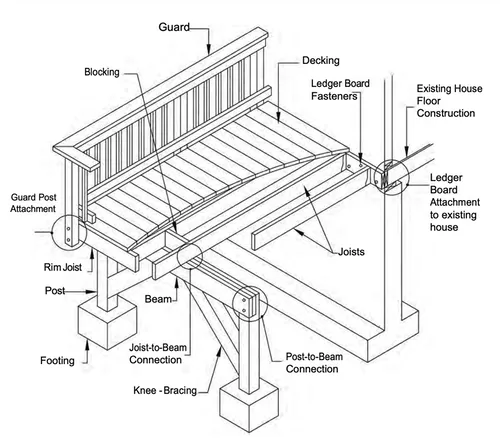Build A Legal DC Deck
Is Your Washington DC Deck Legal & Safe? Requirements for construction of a legal, permitted Washington DC deck. Highlights of the DC Deck Code. Build your deck properly or rebuild a poorly constructed deck to comply with DC guidelines.

DC Deck Building Guide
A Step Up
You can also refer to The American Wood Council’s guide, “Prescriptive Residential Wood Deck Construction Guide,” based on the International Residential Code.
Be sure to study your DC permitting requirements carefully and conform to zoning and design requirements set by your Ward, neighborhood, and/or historic district as well.
DC’s Department of Building Created a Deck Permit
Did you know that the District has a permit specifically for decks?
Start your project by familiarizing yourself with rules, and fees.
Fee Schedule:
The DC Deck Permit fee is based upon the cost of construction. For projects with a construction cost:
- Of less than $500, the permit cost is $36.30
- Between $500 – $1,000, the permit cost is $71.50
- Between $1,001 – $1,000,000, the permit cost is calculated as ($30.00 +(2% of construction value $1001 – $1,000,000)) + 10% and ranges between $55.02 – $22,033
Work With Us
We promote transparency, fairness and outstanding value for your DC real estate representation.
Chat on Whatsapp
Bullet Points
- Review DC’s deck building guide
- Hire a quilified, licensed deck builder
- Obtain a DC Deck Permit
- Complete inspections
Tracey & John
Susan and Alex are amazing! Over the past five years they helped us purchase then later sell a condo, and also purchase a rowhouse. Each time they demonstrated above-and-beyond dedication, expertise, and responsiveness, as well as consummate professionalism. On the buyer side, they will help you structure competitive winning offers. On the seller side, Susan’s knack for renovations and staging was impressive, and our condo sold within a day and for over list price.
How To Build a Legal DC Deck

GETTING STARTED
Define Your Project
1. Single level, multilevel, or a roof deck? Do you live in an historic district? Does your neighborhood offer design guidelines? Will you incorporate electrical, gas or plumbing elements? Adding a ground-level powder room or storage room?
Before beginning your project, clarify your plan and consider all options. You may want to create a Plan A, Plan B and even a Plan C so you'll be able to pivot quickly if permitting or budetary issues arise.
2. What's your timeframe?
Are you building with a special event, season or other circumstance in mind? Research the amount of time planning, permitting and building will take so you're not rushed in the construction phase.
3. Will your dwelling and grounds support the structure?
If you're planning something like a three-tier deck, it's wise to have a structural engineer assess your home for its ability to support the planned addition before proceeding further. Likewise if you're planning a small deck in compact space or one that offers limited opportunity for adequate ground support. Will cantilevers be required? You should obtain a boundary survey to help determine width and length limitations, know your property lines, and consider side and rear setback requirements, and easements, if any. Also, remember that areas beneath your deck will be shaded, so consider how rooms with windows will be affected.
FIRST STEP
Research And Due Diligence
Research and budget planning are the initial steps in building a DC deck. You’ll first want to investigate the design restrictions in your neighborhood, HPRB requirements (see Special Considerations section on this page), DC construction codes, and read about the permitting process in DC.
You can navigate the process yourself, or hire an architect familiar with DC code at the start to help design a compliant plan. Wondering where to find deck design values? Go to: Deck Design values
If you’re adding an under-deck storage room or workshop, get an architect’s input first to make sure these home additions will be approved, and consult an electrician for any electrical additions. You’ll want to get input from a gas contractor if a gas grill is desired. You’ll need to run a gas line. Washington Gas has a preferred contractor in DC. If you’re considering an under-deck powder room, consult an architect and get plumbing and electrical evaluations.
NEXT STEPS
Design And Budget
- After determining what is possible and refining your plan, sketch out your proposed deck structure and select the materials you’d like to use. Tools like Canva and Pinterest can be helpful in creating a design board.
- Add a corresponding spreadsheet outlining material specs and prices. This will aid you in creating a working budget.
- Once you’ve finalized the design elements and initial materials budget for your project, hire an architect to draw up plans.
- Consult with a structural engineer if you haven’t already. Your architect and structural engineer team will assist you in making sure your deck will conform to code, historic district requirements, and the DC Deck Guide before you hire a contractor to begin the work.
- Work up your budget. Keep ‘extras’ in mind, like seat cushions, umbrellas and appliances such as grills and added gas lines, refrigerators & wine coolers sinks, faucets, countertops, lighting and trash receptacles. Research pricing online and by making telephone inquiries to local vendors so you’ll know that your design is achievable and your budget is realistic. Always allow tor slightly more materials than specified by the design and add a pad for unforeseen costs such as labor overtime and additional/supplemental permits and inspections.
NEXT STEP
Hiring Contractors
Now you’re ready to interview contractors to build your deck. If you’ll be adding electrical and plumbing components to your deck, you’ll need to interview contractors for those elements, specifically. The District requires additional permits for plumbing and electrical and they must be obtained by a licensed/bonded/insured DC contractors specific to those trades.
Did you know that the Dept. of Building has a “Find a Contractor” portal?
Not only that, but they also have a Contractor Rating System. It was designed to help you find the best professional for your project. Each building pro receives a score of 1-5 stars, representing the performance of their projects over the past three years during:
- Building permit intake
- Permit plan review
- Construction
The Contractor Rating System offers a variety of building and design professionals including:
- Architects
- Engineers
- Builders
- General contractors
- Contractors
- Home improvement contractors
- Electricians
- Mechanical contractors
- Plumbers
DOB partners with the Better Business Bureau (a more business-friendly entity than consumer-friendly) to help you identify contractors who they say perform well.
DOB Targeted Enforcement
District law now allows DOB to deny issuing a building permit to individuals or entities who have received more than five Stop Work Orders (SWOs) in a 12-month period. But will they?
DOB compiled the following list to identify those who may be subject to heightened enforcement for potentially violating the Construction Code and jeopardizing safety. This list identifies individuals or entities associated with permits issued, and who have large numbers of SWOs.
Wherever you find your contractor, don’t cut corners on a deck–and it’s your responsibility to ensure that your contractor pulls the correct permits and follows the guidelines of the DC Deck Guide and Deck Codes. Always hire a licensed, insured & bonded, experienced DC deck builder. Contractors who are not licensed specifically in DC aren’t licensed in DC. There’s no such thing as being ‘under a DC contractor’s umbrella.”
Check to ensure the insurance is current. Cross-check with the DC Dept. of Building and consumer sites for complaints, reviews and history.
Make sure the contractor is experienced. Ask for photos, addresses and references. Review corresponding PIVS records. Were the decks permitted? Inspected? Does PIVS show incomplete records, or failed inspections? Don’t hesitate to phone previous clients for their anecdotal experiences, but take them with a grain of salt as they’re likely to be the best the contractor can offer. Make sure the referenced addresses line up with PIVS records, or disregard them.
Have a plan before you hire a contractor. That way, you can compare bids without confusion over what it is that they’re building, and how. Don’t rely on the contractor for design, material choice and the details of how the deck is to be constructed. Instead, do your homework, create a plan that complies with all District and neighborhood requirements, seek the advice or assistance of an architect, then interview contractors, presenting each with a printout of the same plan. This way, you’ll get accurate bids.
Have a plan before you hire a contractor. That way, you can compare bids without confusion over what it is that they’re building, and how. Don’t rely on the contractor for design, material choice and the details of how the deck is to be constructed. Instead, do your homework, create a plan that complies with all District and neighborhood requirements, seek the advice or assistance of an architect, then interview contractors, presenting each with a printout of the same plan. This way, you’ll get accurate bids.
Obtain at least two, perferably three bids. Create apples-to-apples spreadsheets and review each contractor’s qualifications against their bid price. Make sure the bids are comprehensive. Go back to contractors for more detail if something is missing. Always get bids in writing.
Use the bids to complete your project budget spreadsheet. You should now have a working budget. Be sure to pad a bit for unexpected issues.
There are numerous tips aonline for hiring and negotiating with contractors. Here are just a few we came across:
NEXT STEP
Pull Permits
You’ll need a DC deck permit to construct your new deck or substantially reconstruct an old one. To obtain it, follow the DOB’s submission guidelines.
- For repair or replacements of deck components (i.e. deck boards and railings), please provide pictures that show the location of the repair or items being replaced.
- For new decks or replacing an entire deck:
- Please view the Deck Guide for submission requirements.
A plat is required for new decks and you can request a Surveyor’s Plat here.
If your property is located in a Historic District, additional requirements and specifications may be mandated. If you modify your design or materials after receiving permit approval, you must resubmit, so be sure that you have your selections finalized before beginning the permitting process.
See the Special Considerations section below, and be sure to check our DC Historic Preservations Guidelines page for links to design guidelines by neighborhood.
More Information
FINAL STEP
Inspections
By now, you should have a beautiful deck! Time to get the work inspected. Following construction, the Dept. of Building must conduct required inspections of deck construction to ensure compliance with the approved plans. Required inspections include footing, framing and final. If the finished deck level is smaller than four feet above grade, a framing inspection is required prior to decking
SPECIAL CONSIDERATIONS
EXTRA STEPS
Pre-Existing Decks
Buying a home that already has a deck? If you’re purchasing a resale home, including a flip or even a home classified as new construction, you’ll want to make sure the deck was properly built. Why? Because violations follow the property, so you literally buy building and safety violations along with your home. Common shortcuts include not building the deck on footers, incorrect footers, improper bracing and improper use of screws, glue and nails. In addition to the DC Deck Guide, read this guide from the American Wood Association titled “Is Your Deck Safely Connected To Your House?” and always get a general inspection and, if possible, a structural engineer inspection for homes with a deck.
EXTRA STEPS
HPRB Approval For Roof Decks
Building a roof deck or buying a house that has a roof deck? You’ll want to check here for the DC Dept. of Buildings Roof Decks and Roof Additions Design Considerations and Submissions guidelines.
The Historic Preservation Review Board (HPRB) generally requires that new roof decks not be visible from surrounding streets or public sidewalks. They want to preserve the character and appearance of DC buildings and streetscapes. New roofdecks typically require a substantial set back. How far? It depends on the height of the proposed deck and its framing, the height of the building and its parapets, the height of adjacent buildings, area topography, street width, and views from public vantage points surrounding the building.
Visibility of roof decks from mid-block alleys is typically not a concern unless the alley has a particular historic character or designation.
If it can be demonstrated that a deck is not visible from street views, a permit application can typically be approved by the Historic Preservation Office (HPO) staff under delegation of authority from the HPRB.
But a roof deck that is visible from a street typically requires review by the HPRB to determine its compatibility.
In order to evaluate a proposed roof deck, the following is required:
1) Scaled roof plan – a dimensioned and scaled drawing showing the entire roof of the building with the proposed deck and setbacks.
2) Photographs – showing the building from the sidewalk on the opposite side of the street, and from oblique views up and down the same sidewalk. Photographs from on top of the roof, showing the height of parapet walls, other roof decks on adjoining properties, and views to the street are strongly encouraged.
3) Section drawing – a dimensioned and scaled drawing showing the deck, the structure supporting the deck, any stair towers or penthouses, and the existing roof and parapet walls.
4) Field test – in most instances, a mock up of the proposed deck on the building is required to ensure that it will not be visible; see below.
If you followed the steps on our page before building your deck, you’ll have these materials at the ready, and won’t have spent time and funds needlessly on a project that would not be approved.
Building without approval and permits in the District of Columbia can have serious consequences, fines and demolition among them.
DECK MAINTENANCE
Congratulations, your deck is the envy of the neighborhood! Be sure to keep it in top condition. Here are some links to checklists and tips:
Disclaimer
We are not contractors, architects, designers or inspectors. The information presented on this site and page is derived from reliable sources, but may be paraphrased, incomplete, or outdated. It is provided for educational purposes only. The Isaacs Team LLC, DOMO of Compass, and Compass, their principals and/or representatives, do not guarantee or warrant its accuracy, completeness, or applicability to any specific construction project. Perform due diligence by reviewing applicable D.C. code, and seek help from a licensed, qualified professional. Citations are not to be deemed endorsements.

